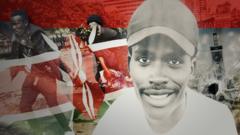The BBC has revealed the identities of members of Kenya's security forces who shot and killed anti-tax protesters outside the country’s parliament last June, an incident that has now drawn widespread condemnation and calls for accountability. Through a meticulous review of over 5,000 images and video footage, the BBC concluded that the individuals killed were unarmed and not posing any threat when the police opened fire.
Kenya’s constitution guarantees citizens the right to peaceful protest, yet the killings provoked an outpouring of anger from the public. Despite a parliamentary order for the Independent Policing Oversight Authority (IPOA) to conduct an investigation, no reports have been released, and no individuals have faced accountability for the tragic events that transpired on June 25, 2024.
The analysis, led by BBC World Service, utilized camera metadata and timing from recorded livestreams to create a comprehensive timeline of the events. This included a 3D reconstruction of the parliament grounds that traced the gunfire back to a police officer and a soldier. Local activists mobilized under the Gen Z banner, effectively utilizing social media to coordinate their efforts for the third large-scale protest since the controversial finance bill was introduced in May.
The protests, characterized by what many described as a festive atmosphere, sought to challenge government plans for increased taxation on essential goods and services. Activist Boniface Mwangi noted the unity between Kenyans from all social classes, rallying to voice their dissent against the ruling class. Tensions escalated as thousands confronted police roadblocks, which ultimately resulted in chaotic clashes by the afternoon.
Outside parliament, protesters began pushing through barriers, leading to an eruption of violence around 14:14 when the Finance Bill 2024 was approved inside the chamber. Disturbing footage captured a plain-clothes officer shouting a command to “kill” before several protesters, including David Chege and Ericsson Mutisya, fell victim to gunfire. Both men were unarmed at the time of their deaths, which have since sparked outrage and demands for a thorough investigation.
Multiple sources have identified John Kaboi, the officer implicated in the shooting, yet he has evaded responsibility for his actions. Despite pleas for accountability and the necessity for reform within law enforcement, the police have refrained from conducting inquiries into possible misconduct.
The chaos did not deter the demonstrators, leading to further incursions on parliamentary grounds where additional shots were fired, claiming the life of finance student Eric Shieni among others. Kenneth Odhiambo, president of the Law Society of Kenya, expressed the chilling reality of the situation, accusing those in authority of serving as judge, jury, and executioner.
As protests persisted, the government eventually conceded to public pressure, announcing the withdrawal of the contentious finance bill. Nevertheless, the lack of accountability for the lives lost on that day has left an indelible mark on the nation.
The unfolding tragedy has illuminated the perilous intersection between civic dissent and state authority, raising profound questions regarding human rights and the role of security forces in maintaining order during public dissent.


















